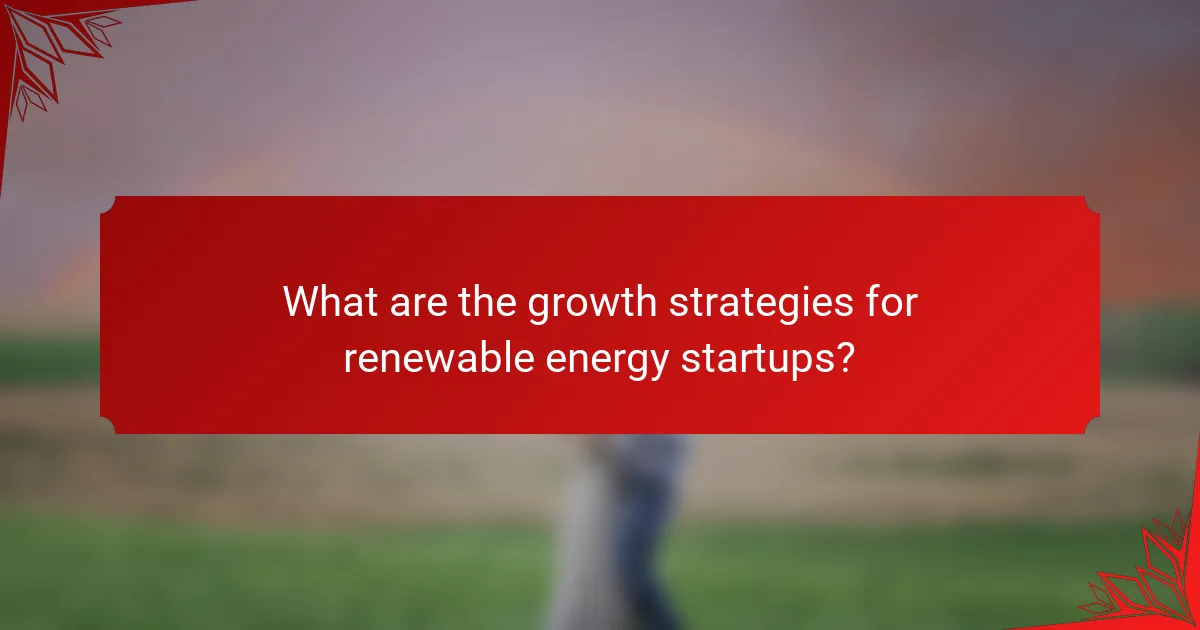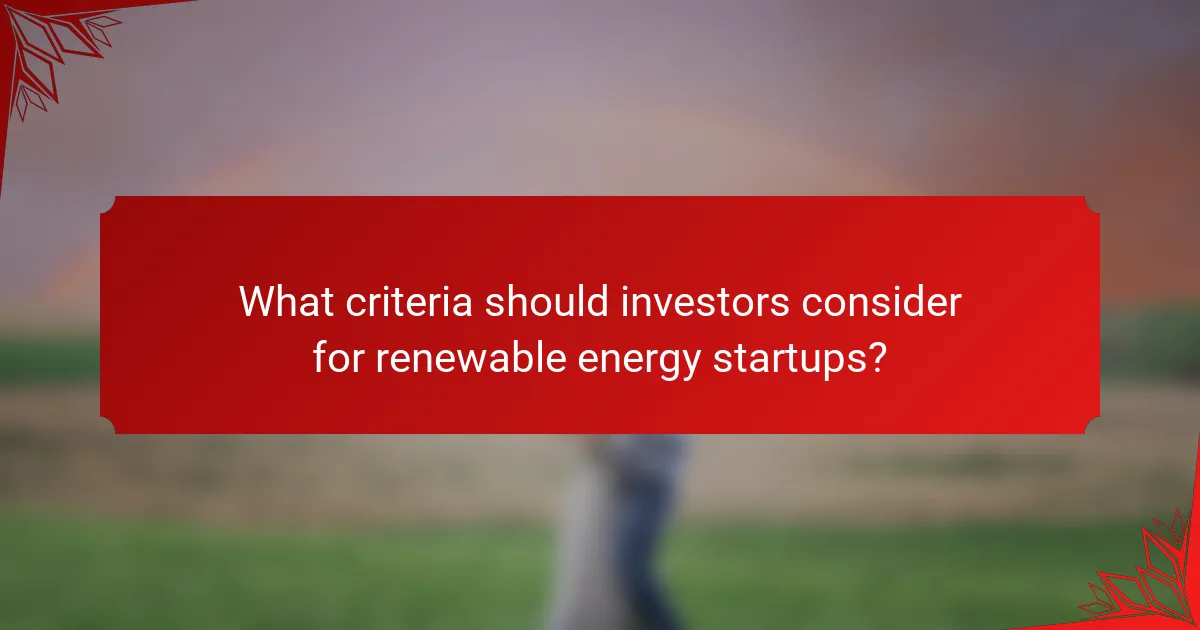The renewable energy sector presents significant market opportunities for startups, fueled by rising demand for clean energy, supportive government initiatives, and technological advancements. By exploring diverse funding avenues such as venture capital and grants, these startups can enhance their growth potential. Strategic partnerships and market expansion further enable them to overcome challenges and thrive in this dynamic landscape.

What are the market opportunities for renewable energy startups in the United States?
Renewable energy startups in the United States can capitalize on significant market opportunities driven by increasing clean energy demand, supportive government policies, and advancements in technology. These factors create a favorable environment for growth and innovation in the sector.
Growing demand for clean energy
The demand for clean energy sources, such as solar, wind, and hydroelectric power, is rising as consumers and businesses seek sustainable alternatives to fossil fuels. This shift is largely influenced by climate change awareness and corporate sustainability goals.
Startups can tap into this growing market by offering innovative solutions that meet consumer needs, such as energy-efficient products or renewable energy services. Engaging with local communities and businesses can help identify specific demands and tailor offerings accordingly.
Government incentives and subsidies
The U.S. government provides various incentives and subsidies to promote renewable energy adoption, including tax credits, grants, and loan programs. These financial supports can significantly lower the initial investment costs for startups.
Startups should explore programs like the Investment Tax Credit (ITC) and the Production Tax Credit (PTC), which can enhance financial viability. Staying informed about changing policies and regulations at both federal and state levels is crucial for maximizing these opportunities.
Technological advancements in energy storage
Recent advancements in energy storage technologies, such as lithium-ion batteries and other innovative solutions, are transforming the renewable energy landscape. Improved storage capabilities allow for better integration of intermittent energy sources like solar and wind into the grid.
Startups focusing on energy storage can benefit from this trend by developing products that enhance efficiency and reliability. Collaborating with technology providers and research institutions can accelerate innovation and help bring competitive solutions to market.

How can renewable energy startups secure funding?
Renewable energy startups can secure funding through various channels, including venture capital, government grants, and crowdfunding. Each option has unique advantages and challenges that startups should consider based on their specific needs and growth stage.
Venture capital investment trends
Venture capital (VC) investment in renewable energy has been on the rise, driven by increasing demand for sustainable solutions. Startups should focus on demonstrating scalability and innovative technology to attract VC interest.
Investors often look for companies that can show a clear path to profitability and a strong market position. Engaging with VC firms that specialize in green technologies can enhance the chances of securing funding.
Government grants and programs
Many governments offer grants and programs to support renewable energy initiatives, which can provide essential funding without the burden of repayment. Startups should research local and national programs that align with their projects.
In the U.S., for example, the Department of Energy provides various funding opportunities for clean energy projects. Startups should prepare detailed proposals that clearly outline their objectives and potential impact to increase their chances of receiving grants.
Crowdfunding platforms for green initiatives
Crowdfunding has emerged as a viable option for renewable energy startups seeking to raise funds from a broad audience. Platforms like Kickstarter and Indiegogo allow entrepreneurs to present their projects and attract small investments from individuals passionate about sustainability.
Successful crowdfunding campaigns often rely on compelling storytelling and clear value propositions. Startups should engage potential backers with informative content and updates throughout the campaign to build trust and encourage contributions.

What are the growth strategies for renewable energy startups?
Renewable energy startups can grow effectively by leveraging strategic partnerships, expanding into emerging markets, and focusing on innovative technologies. These strategies help them navigate challenges and seize opportunities in a rapidly evolving energy landscape.
Partnerships with established energy companies
Forming partnerships with established energy companies can provide renewable energy startups with essential resources, industry expertise, and market access. Such collaborations can facilitate technology sharing, co-development of projects, and even financial backing, which are crucial for scaling operations.
Startups should seek partnerships that align with their goals and values, ensuring mutual benefits. For instance, a solar startup might collaborate with a utility company to integrate solar solutions into their existing infrastructure, enhancing both parties’ offerings.
Expansion into emerging markets
Emerging markets present significant growth opportunities for renewable energy startups due to increasing energy demands and a shift towards sustainable solutions. Regions such as Southeast Asia, Africa, and Latin America are investing heavily in renewable infrastructure, often with supportive government policies.
Startups should conduct thorough market research to understand local regulations, energy needs, and potential barriers. Tailoring solutions to fit local contexts, such as affordable solar products for rural areas, can enhance market penetration and customer adoption.
Focus on innovative technologies
Investing in innovative technologies is vital for renewable energy startups to differentiate themselves and improve efficiency. This can include advancements in energy storage, smart grid technology, or new methods of energy generation that reduce costs and environmental impact.
Startups should prioritize research and development to stay ahead of industry trends. For example, developing more efficient solar panels or exploring offshore wind energy can position a startup as a leader in the renewable sector. Additionally, securing intellectual property rights can protect innovations and attract investors.

What challenges do renewable energy startups face?
Renewable energy startups encounter several significant challenges that can hinder their growth and success. Key issues include navigating regulatory landscapes, competing with established traditional energy sources, and securing a skilled workforce.
Regulatory hurdles and compliance
Renewable energy startups often face complex regulatory frameworks that vary by region. Compliance with local, state, and federal regulations can be time-consuming and costly, requiring startups to invest in legal expertise and administrative resources.
Startups must stay updated on evolving policies, such as renewable portfolio standards and tax incentives, which can significantly impact their operations. Engaging with local authorities and industry associations can help navigate these challenges effectively.
Competition from traditional energy sources
Traditional energy sources, such as fossil fuels, often benefit from established infrastructure and lower initial costs, creating a competitive disadvantage for renewable energy startups. These companies must demonstrate the long-term economic and environmental benefits of their solutions to attract customers and investors.
To differentiate themselves, startups can focus on innovative technologies, customer service, or niche markets. Building partnerships with other businesses can also enhance their market position against traditional competitors.
Access to skilled workforce
Finding and retaining a skilled workforce is a critical challenge for renewable energy startups. The industry requires expertise in engineering, project management, and regulatory compliance, which can be scarce in certain regions.
Startups should consider offering competitive salaries, flexible working conditions, and opportunities for professional development to attract talent. Collaborating with educational institutions for internships and training programs can also help build a pipeline of skilled workers.

What criteria should investors consider for renewable energy startups?
Investors should focus on market potential, technology differentiation, and the experience of the management team when evaluating renewable energy startups. These criteria help assess the viability and growth prospects of the business in a competitive landscape.
Market potential and scalability
Market potential refers to the size and growth rate of the target market for a renewable energy startup. Investors should analyze current energy demands, government policies promoting renewables, and regional market trends to gauge scalability. For example, startups targeting emerging markets may find significant opportunities due to increasing energy needs and supportive regulations.
Scalability involves the startup’s ability to grow its operations efficiently. Investors should consider whether the business model can be expanded geographically or through new product offerings without a proportional increase in costs. A startup with modular technology, such as solar panels that can be deployed in various settings, often has better scalability prospects.
Technology differentiation
Technology differentiation is crucial for a renewable energy startup to stand out in a crowded market. Investors should evaluate how the startup’s technology compares to existing solutions in terms of efficiency, cost-effectiveness, and environmental impact. For instance, a startup developing a unique energy storage solution may attract interest due to its potential to enhance grid reliability.
Additionally, understanding intellectual property (IP) protection is essential. A startup with strong patents or proprietary technology can create barriers to entry for competitors, increasing its attractiveness to investors. Investors should assess the strength of the startup’s IP portfolio and its potential for future innovation.
Management team experience
The experience of the management team plays a vital role in the success of a renewable energy startup. Investors should look for a team with a proven track record in the energy sector, as well as expertise in scaling businesses. A diverse team with backgrounds in engineering, finance, and operations can provide a well-rounded approach to tackling industry challenges.
Furthermore, the management team’s ability to navigate regulatory environments and secure funding is critical. Startups led by individuals with established networks in the renewable energy space may have better access to resources and partnerships, enhancing their chances of success. Investors should evaluate the team’s past achievements and their vision for the future of the startup.

How do renewable energy startups compare in different regions?
Renewable energy startups vary significantly across regions due to differences in market dynamics, growth potential, and regulatory environments. Understanding these factors is crucial for entrepreneurs seeking to navigate the global landscape effectively.
North America vs Europe market dynamics
In North America, renewable energy startups benefit from a diverse energy market and substantial venture capital investment, particularly in solar and wind technologies. However, competition is fierce, and companies must differentiate themselves through innovation and efficiency.
Europe, on the other hand, is characterized by strong governmental support for renewable initiatives, including ambitious targets for carbon neutrality. Startups here often find opportunities in energy storage and smart grid technologies, supported by various funding programs and incentives.
Asia-Pacific growth potential
The Asia-Pacific region presents immense growth potential for renewable energy startups, driven by rapid urbanization and increasing energy demands. Countries like China and India are investing heavily in solar and wind energy, creating a vibrant market for innovative solutions.
Startups in this region can leverage lower labor costs and a growing middle class, but they must navigate challenges such as infrastructure limitations and varying levels of regulatory support across different countries.
Regulatory environments across regions
Regulatory environments significantly impact the success of renewable energy startups. In North America, policies can vary widely between states, affecting incentives and market access. Startups must stay informed about local regulations to capitalize on available support.
In Europe, the regulatory framework is generally more unified, with the European Union promoting renewable energy through directives and funding. Startups can benefit from these policies but must comply with stringent environmental standards.
In the Asia-Pacific region, regulations are evolving, with some countries offering favorable policies to attract investment in renewables. However, startups should be cautious of potential regulatory changes that could impact their operations and funding opportunities.



